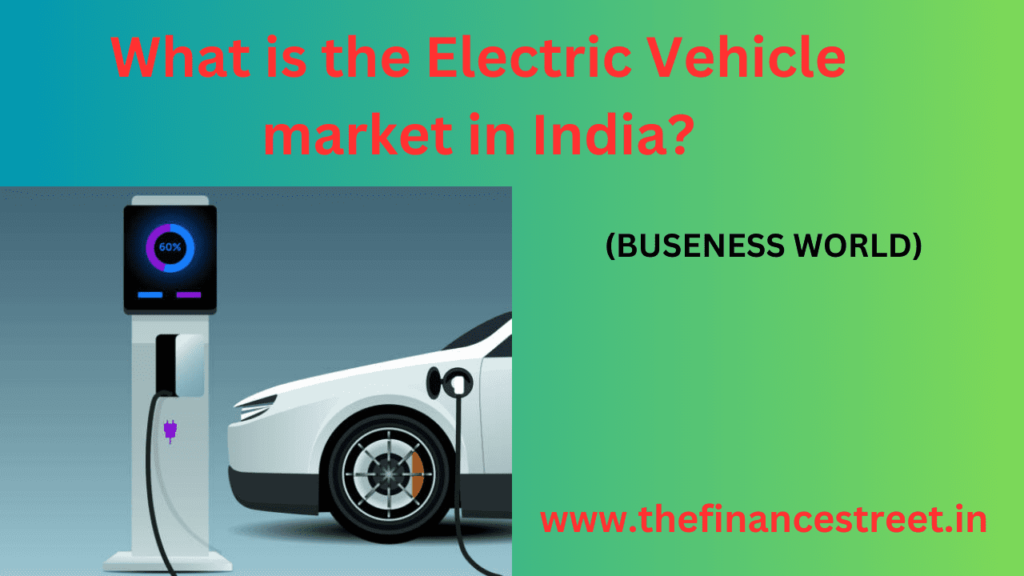Introduction-
The electric vehicle (EV) market in India is poised at the forefront of a transformative shift in the automotive industry, driven by a growing imperative for sustainability and environmental stewardship. With increasing concerns about air pollution, rising fuel prices, and the need to reduce carbon emissions, electric vehicles have emerged as a promising solution to meet the evolving mobility needs of the nation.
Against this backdrop, the EV market in India represents a dynamic and rapidly evolving ecosystem characterized by innovation, investment, and policy support. As the country strives to transition towards cleaner and greener transportation alternatives, the electric vehicle sector is witnessing significant momentum, spurred by government initiatives, technological advancements, and changing consumer preferences.
This introductory facet delves into the evolving landscape of the electric vehicle market in India, exploring key drivers, challenges, and opportunities shaping its trajectory. From policy interventions and infrastructure development to technological innovation and market dynamics, the journey of electric mobility in India unfolds against a backdrop of transformative change and unprecedented potential.
As we embark on this exploration, we delve deeper into the multifaceted dimensions of the EV market in India, uncovering insights, trends, and implications that illuminate the path towards a sustainable and resilient future for mobility in the country.
What is the Electric Vehicle market in India?
As the electric vehicle (EV) market in India has been experiencing significant growth and development. Here are some key points regarding the EV market in India:
- Government Initiatives: The Indian government has been actively promoting the adoption of electric vehicles as part of its efforts to reduce carbon emissions and combat air pollution. Various incentives, subsidies, and policies have been introduced to encourage the production, purchase, and use of EVs.
- Favorable Policies: Initiatives such as the Faster Adoption and Manufacturing of Hybrid and Electric Vehicles (FAME) scheme provide financial incentives for the adoption of EVs, including subsidies for electric vehicle purchases and charging infrastructure development.
- Rising Demand: There has been a growing demand for electric vehicles in India, driven by increasing environmental awareness, rising fuel prices, and improvements in EV technology. Consumers are increasingly opting for electric cars, two-wheelers, and commercial vehicles as viable alternatives to traditional gasoline vehicles.
- Expansion of EV Ecosystem: The EV ecosystem in India is expanding rapidly, with several domestic and international automakers launching electric vehicles in the market. Additionally, there has been a surge in the development of EV charging infrastructure across major cities and highways to support the growing fleet of electric vehicles.
- Focus on Two-Wheelers: Electric two-wheelers, such as electric scooters and motorcycles, have emerged as the leading segment in the Indian EV market. Several startups and established players have entered this space, offering affordable and efficient electric two-wheelers targeted at urban commuters.
- Challenges: Despite the growth potential, the Indian EV market faces challenges such as high upfront costs, limited charging infrastructure, range anxiety, and concerns about battery life and recycling. Addressing these challenges will be crucial for accelerating the adoption of electric vehicles across different segments.
Overall, the electric vehicle market in India presents significant opportunities for growth and innovation, driven by supportive government policies, increasing consumer demand, and advancements in EV technology. However, continued efforts are needed to overcome challenges and create a conducive environment for the widespread adoption of electric vehicles in the country.
What are the challenges for EV market in India?
The electric vehicle (EV) market in India faces several challenges that hinder its widespread adoption and growth. Some of the key challenges include:
- High Initial Cost: Electric vehicles typically have higher upfront costs compared to traditional internal combustion engine vehicles, primarily due to the cost of batteries. This makes EVs less affordable for many consumers, especially in a price-sensitive market like India.
- Limited Charging Infrastructure: The availability of charging infrastructure remains limited in India, particularly in rural and semi-urban areas. A lack of adequate charging stations and long charging times can lead to range anxiety among EV users and deter potential buyers from switching to electric vehicles.
- Range Anxiety: The limited driving range of electric vehicles compared to conventional vehicles is a significant concern for consumers. Range anxiety, or the fear of running out of battery charge before reaching a charging station, remains a barrier to EV adoption, particularly for long-distance travel.
- Battery Technology and Performance: Battery technology plays a critical role in the performance and range of electric vehicles. Issues such as battery degradation over time, limited lifespan, and concerns about the availability of charging infrastructure for battery swapping or replacement pose challenges for EV manufacturers and consumers alike.
- Infrastructure Development: Accelerating the development of EV charging infrastructure is crucial for supporting the widespread adoption of electric vehicles. This requires significant investments in charging stations, grid infrastructure upgrades, and policy support to incentivize private and public investments in charging infrastructure deployment.
- Consumer Awareness and Education: Many consumers in India are still unfamiliar with electric vehicles and their benefits. Lack of awareness about EV technology, benefits, incentives, and operating costs can deter potential buyers from considering electric vehicles as viable alternatives to traditional vehicles.
- Policy and Regulatory Framework: While the Indian government has introduced various incentives and policies to promote electric vehicles, there is a need for a comprehensive and stable regulatory framework to support the EV ecosystem. This includes incentives for EV manufacturing, charging infrastructure development, and research and development in EV technology.
Addressing these challenges requires coordinated efforts from government, industry stakeholders, and other relevant parties to overcome barriers to EV adoption and create a conducive environment for the growth of the electric vehicle market in India.
What are the advantages of global market for EV market in India?
The global market presents several advantages for the electric vehicle (EV) market in India, including:
- Access to Advanced Technology: Access to the global market allows Indian EV manufacturers to leverage advanced technology, expertise, and best practices from established international players. This can accelerate innovation and improve the quality, performance, and reliability of electric vehicles produced in India.
- Economies of Scale: Integration into the global supply chain enables Indian EV manufacturers to benefit from economies of scale in sourcing components, materials, and technology. Bulk procurement and strategic partnerships with global suppliers can lead to cost efficiencies and competitive pricing for EVs in the Indian market.
- Market Expansion Opportunities: The global market provides opportunities for Indian EV manufacturers to expand their presence beyond domestic borders. Exporting electric vehicles to international markets can diversify revenue streams, mitigate risks associated with domestic market fluctuations, and enhance the competitiveness of Indian EV brands on the global stage.
- Knowledge Transfer and Collaboration: Collaboration with international partners, research institutions, and industry associations fosters knowledge transfer, skill development, and technology exchange in the Indian EV ecosystem. This collaboration can lead to the development of innovative solutions, new business models, and enhanced capabilities in EV manufacturing, design, and engineering.
- Brand Building and Recognition: Penetrating global markets enhances the visibility, credibility, and reputation of Indian EV manufacturers on the world stage. Successful entry into international markets builds brand recognition, trust, and confidence among consumers, investors, and stakeholders, thereby strengthening the long-term viability and sustainability of Indian EV brands.
- Regulatory Harmonization: Aligning with global standards and regulations in the EV industry facilitates market access and regulatory compliance for Indian EV manufacturers. Conforming to international norms in vehicle safety, emissions, and performance standards enhances product acceptance, facilitates trade, and streamlines market entry into global markets.
- Innovation and R&D Collaboration: Participation in the global EV market fosters innovation, research, and development collaborations between Indian and international stakeholders. Joint ventures, technology partnerships, and R&D initiatives with global players stimulate innovation, drive technological advancements, and enhance the competitiveness of Indian EV manufacturers in the global arena.
In summary, integration into the global market offers significant advantages for the EV market in India, including access to advanced technology, economies of scale, market expansion opportunities, knowledge transfer, brand building, regulatory harmonization, and collaboration in innovation and research. Leveraging these advantages can propel the growth and competitiveness of the Indian electric vehicle industry on a global scale.
Critical Analysis of the Electric Vehicle market in India-
A critical analysis of the electric vehicle (EV) market in India reveals both opportunities and challenges as the country strives to transition towards sustainable transportation. Here’s a breakdown:
Opportunities:
- Government Support: The Indian government has shown strong commitment to promoting EV adoption through various initiatives such as subsidies, incentives, and policy frameworks like the Faster Adoption and Manufacturing of Electric Vehicles (FAME) scheme. This support creates a favorable environment for EV manufacturers and consumers alike.
- Growing Demand: There is a rising awareness among consumers about the environmental benefits of electric vehicles, coupled with increasing concerns about air pollution and fuel prices. This growing demand presents a significant opportunity for EV manufacturers to tap into a potentially lucrative market.
- Innovation and Technology: Indian EV manufacturers are investing in research and development to improve battery technology, increase vehicle range, and enhance performance. This focus on innovation enables the development of indigenous solutions tailored to the unique needs and challenges of the Indian market.
- Infrastructure Development: The expansion of EV charging infrastructure is gaining momentum across major cities and highways in India. Public and private investments in charging stations, battery swapping facilities, and supportive infrastructure are crucial for addressing range anxiety and boosting consumer confidence in EVs.
- Partnerships and Collaborations: Indian EV manufacturers are forging partnerships with global players to access advanced technology, expertise, and market opportunities. Collaborations in areas such as battery manufacturing, electric drivetrains, and charging infrastructure contribute to the growth and competitiveness of the Indian EV industry.
Challenges:
- High Initial Cost: The high upfront cost of electric vehicles remains a significant barrier to adoption for many consumers, especially in a price-sensitive market like India. Affordability concerns need to be addressed through incentives, subsidies, and innovative financing options to make EVs more accessible to a wider audience.
- Charging Infrastructure: Despite progress, the availability of charging infrastructure in India is still limited, particularly in rural and semi-urban areas. Building a robust charging network, including fast-charging stations and battery swapping facilities, is essential for fostering EV adoption and addressing range anxiety among consumers.
- Battery Technology: Battery technology plays a crucial role in the performance, range, and cost of electric vehicles. Challenges such as battery degradation, limited lifespan, and dependence on imported lithium-ion batteries pose risks to the sustainability and competitiveness of the Indian EV industry.
- Policy and Regulatory Framework: While the Indian government has introduced supportive policies and incentives for EVs, there is a need for greater clarity, consistency, and long-term planning in the regulatory framework. Addressing issues related to taxation, subsidies, import duties, and standards will create a more conducive environment for EV manufacturers and investors.
- Consumer Awareness and Perception: Despite increasing awareness, there is still a lack of understanding among consumers about the benefits and feasibility of electric vehicles. Educating consumers about the advantages of EVs, dispelling myths about range limitations and charging infrastructure, and promoting test drives and incentives can help drive adoption.
In conclusion, while the electric vehicle market in India holds immense potential for growth and sustainability, overcoming challenges such as high costs, charging infrastructure limitations, battery technology constraints, and policy uncertainties requires concerted efforts from stakeholders across government, industry, and society. Addressing these challenges will be crucial for accelerating the transition towards a cleaner, greener transportation ecosystem in India.



